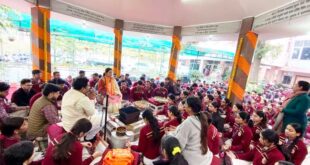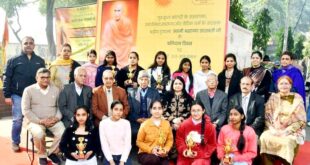 Diwali or Deepavali is an important religious festival which is celebrated in India and abroad. It is festival which is celetrated by Hindus, Sikhs and other communities with equal fun and fervour. It is often called the ‘Festival of Lights’ usually falls between October and November. The word Diwali is a variation of the Sanskrit word ‘Deepavali’ which means ‘a continuous line of lamps”. It is the time to have fun with friends, family, relatives. People enjoy exchange of delicious sweets, watch fireworks, clean the homes and decorate them. Fireworks is also a tradition during the Diwali Festival but these are a source of pollution. That is why green crackers are the need of the day.
Diwali or Deepavali is an important religious festival which is celebrated in India and abroad. It is festival which is celetrated by Hindus, Sikhs and other communities with equal fun and fervour. It is often called the ‘Festival of Lights’ usually falls between October and November. The word Diwali is a variation of the Sanskrit word ‘Deepavali’ which means ‘a continuous line of lamps”. It is the time to have fun with friends, family, relatives. People enjoy exchange of delicious sweets, watch fireworks, clean the homes and decorate them. Fireworks is also a tradition during the Diwali Festival but these are a source of pollution. That is why green crackers are the need of the day.
There are legends to the celebration of Diwali. One legend states that Lord Krishna killed the evil demon King of Pragjyotishpur to set free 16,000 daughters of the Gods. Another legend has the Hindu King Rama destroying Ravana, King of Sri Lanka and Rama’s return to Ayodhaya. People in jubilant mood lighted the lamps to depict reaffirmation of hope and a renewed commitment to goodwill.
The Sikhs celebrate Diwali with great zeal and zest, energy and enthusiasm. They call it a pious day when the Sixth Guru of the Sikhs Sri Guru Hargobind Ji was released from the Gwalior Fort and reached Amritsar. In the fort, fifty-two Rajas were also the prisoners who were also freed. In honour of the Guruji and the arrival of Rajas, the lights of joy and victory were lighted up. It is also called ‘Bandi Chhor Diwas’.
The festival is also celebrated as Mahalaxmi Puja which is a symbol of cleanliness, people clean their homes and decorate to celebrate Diwali. However, there is a myth about playing gambling on this day but infact, it is a blot on society and the pious festival. Ayodhaya is one of the many cities of India where Diwali has its own importance. However, in Kerela, it is celebrated to a lesser extent.’
Diwali in Bengal coincides with Kali Puja or Shyama Puja at night. Devotees offer sweets, lentils, rice etc. to ‘Ma Kali’. Varanasi celebrates the Diwali of Gods known as the ‘Dev Deepawali’. Prayers and Diyas are offered to river Ganga and the banks, beautified with lamps and rangolis. In Odisha, people celebrate Diwali in the form of ‘Kauriya Kathi’. It is a ritual in which people worship their ancestors in heaven. The people worship Goddess Lakshmi, Lord Ganesha and Goddess Kali. Maharashtra celebrates Diwali with the ‘Vasu Baras’ ritual that takes place to honour cows. They also celebrate the love of husband and wife. Gujratis celebrate with ‘Vaag Baras’ followed by ‘Dhanteras’, ‘Kali Chaudash’, Diwali and ‘Bhai Bij’.
In Goa, Diwali is dedicated to Lord Krishna destroying the demon Narkasur. Many people in Goa and parts of South India, they smear coconut oil on the bodies to free themselves of sin.
People of Andhra Pradesh chant prayers and seek blessings from the clay idol, Satyabhama. After that they start enjoying the festival with their dear ones with fun and fervour. However, Tamilians get up at the dawn time to bathe in oil infused with betel leaves, fragrant pepper etc. After taking bath, they consume a tonic Deepavali Lehiyam before enjoying the feast.
Every Indian celebrates and welcomes the festival of Diwali irrespective of cultures and background. The necessary rituals remain the same throughout the country like lighting of earthen lamps or electrical illuminations in modern times at temples and homes that forms the common feature. Infact, there are five days of Diwali beginning with Dhanteras, then Chotti Diwali followed by the Main Diwali, the fourth day is the day of Govardhan Puja and the last day of the festival is Bhai Dooj. Main Diwali is usually celebrated twenty days after the Dusshera, also called Vijayadashmi. Overall, the festival represents the victory of light over darkness, knowledge over ignorance and good over evil.
Note: This article is dedicated to Smt. Alka Puri, M.A. (Hindi, B.Ed.) who was the Secretary, Ladies Club, Punjabi University, Patiala during the tenure of Vice Chancellor Dr. S.S Johal, awarded with Padma Bhushan in 2004. Smt. Alka Puri was the wife of Dr. Ajit Singh Puri and mother of Journalist Dr. Jaswant Singh Puri. 2310202204

Dr. Jaswant Singh Puri
Doctor of Letters (Honoris Causa)
Patiala
M – 9316520136
 Punjab Post Daily Online Newspaper & Print Media
Punjab Post Daily Online Newspaper & Print Media




